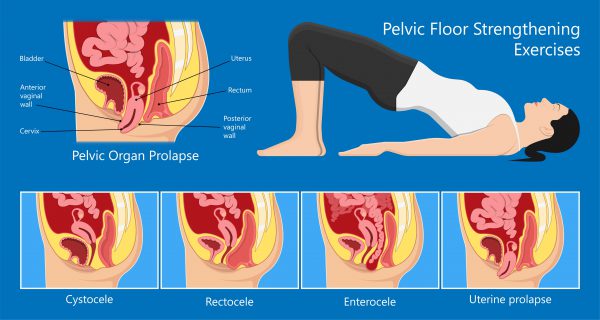
Physical Therapists are experts in treating pain, restoring function, and educating patients about therapeutic exercises and lifestyle changes that can heal the body. Pelvic Floor Physical Therapists specialize in treating women throughout the lifespan.
Our care is private and gentle. We are respectful and work with each patient to achieve success with treatment techniques that are comfortable for each client.
These are some conditions that pelvic floor PT can help:
Bladder Incontinence– Loss of bladder control. This can occur with an urgent sensation of needing to urinate or with activities such as exercise, lifting or even a cough or sneeze. Some women will have complaints of urinary urgency and frequency or excessive nighttime voiding. Building strength and control of your pelvic floor muscles is currently supported by science as the best way to treat this problem.
Bowel incontinence– Loss of bowel control. This can involve a complete loss of control, staining of underwear or just an inability to feel completely clean after a bowel movement. PT can help regain control of your anal muscles and teach some lifestyle changes to help correct this problem.
Scars– Scars post-partum can occur due to C- section delivery as well as at the perineum (vaginal and anal area). Scar tissue mobilization and stretching can help prevent pain and dysfunction.
Coccyx (tail bone) pain– Pain in the literal “rear”, often with sitting, but can occur in any position or with movement. Injury to the pelvic muscles is often the driver of this type of pain. PT can help by teaching you some techniques to allow healing and assist with exercises or soft tissue massage that will help alleviate this pain.
Sexual dysfunction– This can be pain, lack of sensation, or feeling of dissatisfaction. A 2017 study showed that 64.9% of postpartum women experienced some type of sexual dysfunction in the year after childbirth. PT can help reduce pain, regain sensation and improve overall sexual satisfaction due to pelvic floor injury. Pain with intimacy is never normal. Pelvic floor PT can be part of the solution.
Prolapse– Descent or dropping of internal pelvic organs including the bladder, rectum and uterus. The pelvic floor and ligaments form a hammock of support to keep these organs in place. Vaginal childbirth increases the risk of pelvic organ prolapse. PT can help women build strong deep core (including the pelvic floor) to prevent this from occurring. We can help women with prolapse to improve strength and learn techniques to manage prolapse.

Diastasis Recti Abdominus (DRA)– Separation of the abdominal muscles of the abdomen, often resulting from pregnancy. There are good (and not so good) ways to rehab DRA and Individualized PT sessions will assess your level of DRA and provide an individualized treatment plan.
Pelvic Girdle/Low back pain– Pain within or around the pelvis and low back. Pregnancy and delivery (whether vaginal or by C-section) can create muscle weakness, spasm and pelvic instability. We can help you reduce pain, increase strength and rebuild your core.
Pelvic and perineal pain and IC/BPS – Endometriosis, interstitial cystitis (IC) or bladder pain syndrome (BPS) often has a component of pelvic floor dysfunction. We can help to reduce this pain and dysfunction and guide you through proven lifestyle changes and other modalities to reduce and manage pain. Women who experience pain with intimacy, whether this has always been the case or is a new symptom, are often great candidates for PT care.

What to expect on your first visit
Pelvic Floor Rehabilitation is done at our Glenn Mitchell location. The therapy consists of 6-8 initial weekly sessions. Patients come in once a week, for the first two sessions, and then will come in once every two weeks, preferably on the same day each week. The first visit will take a little longer than the rest. It will take approximately one hour. Follow-up visits are scheduled for 45 mins.
Your therapist will ask you questions about your symptoms, medical history, and go over goals for care. We will discuss our thoughts and explain all aspects of care before we start any hands-on care. We will perform an examination that may include your back mobility, hip and pelvic mobility, general range of motion, and strength. We will usually perform an internal pelvic exam if you consent and feel comfortable.
Preparing for the therapy:
- Wear comfortable clothing that allows you to move around – like in a yoga class
- Please arrive 10 minutes prior to your scheduled appointment so that that you have time to empty your bladder prior to the therapy.
The ultimate goal is for our Pelvic Floor PT program to help you get back to the living the life you want!

